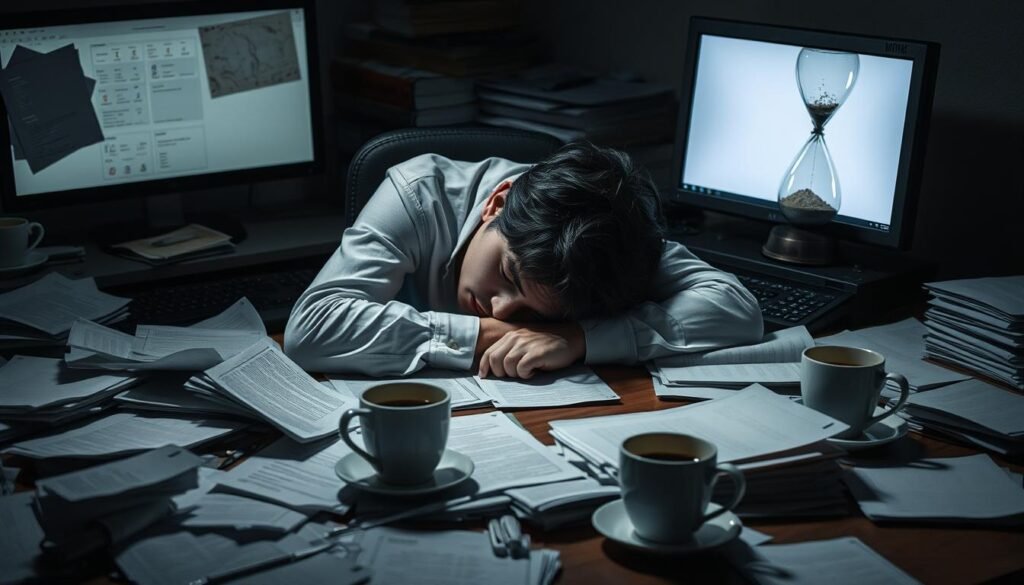Did you know that around 31% of U.S. adults face anxiety disorders at some time? This fact shows how common anxiety is, leading many to feel very tired. It’s key to know the difference between anxiety and fatigue. Error in identifying them can affect treatment success. Anxiety shows up as constant worry and emotional stress. On the other hand, fatigue is feeling extremely tired or having no energy.
We’re going to look closer at the symptoms and causes of both issues. We’ll see how they overlap and affect each other. Knowing these differences helps people handle anxiety better and tackle fatigue more effectively.
Key Takeaways
- Anxiety disorders affect approximately 31% of adults in the U.S.
- Understanding the distinction between anxiety and fatigue is crucial for effective treatment.
- Chronic anxiety can cause exhaustion despite adequate rest.
- Managing anxiety naturally can alleviate some fatigue symptoms.
- Cognitive Behavioral Therapy (CBT) is helpful in treating both anxiety and fatigue.
Understanding Anxiety: Symptoms and Triggers
Anxiety touches many lives each year, showing up in different ways. Recognizing the signs of anxiety symptoms and what triggers them is key. This knowledge helps people understand their own feelings and find ways to handle them.
Anxiety Symptoms
Anxiety impacts both the mind and body. Common anxiety symptoms include:
- Persistent worry or feeling on edge
- Increased heart rate
- Restlessness or difficulty relaxing
- Chest pain or discomfort
- Difficulty concentrating or mind going blank
More than 6.8 million adults in the U.S. suffer from generalized anxiety disorder. This condition is marked by ongoing worry. About 2-3% of Americans deal with panic disorder each year. They experience sudden intense anxiety attacks, with symptoms like dizziness or shortness of breath.
Common Triggers of Anxiety
Common triggers of anxiety differ from person to person, often linked to certain stressors. Some well-known triggers are:
- Financial concerns or job pressures
- Social situations or public speaking
- Health-related issues or chronic illnesses
- Substance misuse contributing to anxiety symptoms
- Significant life changes, such as moving or changing jobs
About 15 million adults suffer from social anxiety disorder. It causes intense fear in social settings. Knowing what triggers anxiety can help people develop ways to cope. This could lead to better mental health.
Exploring Fatigue: Causes and Symptoms
Fatigue is more than being tired. It involves factors that cause physical and mental exhaustion. Knowing the fatigue causes helps tackle the issue effectively. Common causes are not enough sleep, health problems, stress, and bad lifestyle choices.
Fatigue Causes
Many things can cause fatigue. Important factors are:
- Lack of Sleep: Often leads to feeling weary and trouble thinking clearly.
- Medical Conditions: Illnesses like diabetes or heart disease can make you constantly tired.
- Emotional Stress: Long-lasting stress can increase how tired you feel.
- Lifestyle Factors: Eating poorly or not exercising can add to feeling tired, both in your body and mind.
Physical and Mental Symptoms of Fatigue
Fatigue shows through different physical and mental signs. These symptoms help us see how deeply it affects us. They may include:
| Physical Symptoms | Mental Symptoms |
|---|---|
| Chronic tiredness | Poor concentration |
| Muscle soreness | Lack of motivation |
| Subpar sleep quality | Irritability |
| Frequent yawning | Anxiety or mood swings |
It’s crucial to deal with the physical and mental symptoms of fatigue. For those feeling more tired because of anxiety, trying better sleep habits and mindfulness can help. For more tips, checking out how anxiety can cause fatigue can offer useful advice and insights.

The Connection Between Anxiety and Fatigue
Anxiety and fatigue often occur together, affecting both mind and body. They share a complex relationship. Anxiety can significantly cause fatigue. Knowing how they connect helps us understand why they often happen at the same time.
How Anxiety Can Lead to Fatigue
Anxiety springs up the fight or flight response, raising cortisol levels. This can make you restless, stopping relaxation and messing with sleep. Poor sleep deeply affects fatigue. People then feel very tired, making their anxiety worse. This cycle makes coping harder as anxiety increases fatigue even more.
Chronic Stress and Its Impact
Prolonged stress boosts both anxiety and fatigue. It keeps the body in a *constant state of alert*, using up energy. This lack of energy troubles daily life, making usual activities hard. Studies show that fighting stress is key to lessen fatigue. They say to exercise at least 150 minutes a week and sleep 7-9 hours nightly.
| Factor | Effect on Anxiety | Impact on Fatigue |
|---|---|---|
| Elevated Cortisol Levels | Increases alertness | Disrupts sleep patterns |
| Chronic Stress | Heightens anxiety symptoms | Leads to persistent tiredness |
| Lack of Sleep | Aggravates anxiety | Contributes to exhaustion |
| Physical Activity | Reduces anxiety levels | Enhances energy and vitality |
Understanding the link between anxiety and fatigue is vital for managing them. Seeking help from a professional can provide support. It also offers strategies to overcome these linked issues.
Difference between Anxiety and Fatigue
Understanding the difference between anxiety and fatigue is crucial. While both can affect someone’s life, their symptoms and causes are different. Knowing these differences helps in finding the right treatment for each.
Key Distinctions in Symptoms
Anxiety and fatigue show unique symptoms, though they can share some. Anxiety symptoms include:
- Emotional exhaustion, such as constant worry or fear
- Difficulty concentrating or staying focused
- Restlessness and a hard time relaxing
Fatigue, however, often means feeling physically tired. This includes:
- Chronic weakness or feeling very tired
- Sleepiness during the day, even after good rest
- Easy fatigability with little effort
Knowing these symptoms helps to distinguish between anxiety and fatigue. This knowledge assists in seeking the right path to recovery.
Psychological vs. Physical Exhaustion
Discussing anxiety and fatigue often brings up psychological versus physical exhaustion. Psychological exhaustion comes from stress or emotional issues, often seen in anxiety. This can lead to mental fatigue and trouble handling everyday tasks.
Physical exhaustion, on the other hand, results from factors like lifestyle, medical conditions, or lack of rest. Those with physical fatigue might feel weak, constantly sleepy, or have low energy. The CDC suggests at least 150 minutes of moderate exercise weekly and at least 7 hours of sleep nightly to help combat fatigue.
Understanding these distinctions helps people recognize their own experiences. This enables seeking suitable treatment and making changes for a healthier life. A thorough history and observation help healthcare workers find the best care strategy for each person.
Impact on Daily Life: How Anxiety and Fatigue Affect Each Other
Anxiety and tiredness deeply impact our daily life and happiness. Anxiety brings about worry and restlessness, which can make you feel very tired. This situation can start a cycle where being tired makes anxiety worse. This makes it hard to keep up with everyday tasks.
Anxiety and Tiredness
Anxiety sets off our body’s stress response. This action increases stress hormones like adrenaline and cortisol. Over time, these can make us feel mentally and physically worn out. People with anxiety may have difficulties falling asleep. Worry and racing thoughts make it tough to get good sleep. Bad sleep can raise stress hormone levels, making anxiety worse. It’s important to know how anxiety and tiredness affect each other.
How Fatigue Can Exacerbate Anxiety Symptoms
Constant tiredness can make anxiety symptoms worse. It can leave you feeling overwhelmed and helpless. When we’re tired, our ability to think clearly and manage emotions goes down. This can make dealing with anxiety even harder. Many people get caught in a bad loop, where tiredness and anxiety feed into each other. Being stuck in this cycle for too long can harm our relationships, work, and overall well-being.

Managing Anxiety and Fatigue Naturally
Finding ways to manage anxiety and fatigue naturally can make you feel better overall. Making simple changes in your life is key to feeling less tired and anxious. These include physical and mental actions that help you find more balance every day.
Managing Anxiety Naturally
There are many ways to handle anxiety without medicine. Taking walks or doing yoga can help lower your stress levels. Studies show that herbal remedies like chamomile can help with anxiety.
Using weighted blankets can also increase calmness. Meditation leads to mindfulness, helping you relax. If anxiety is a big problem, talking to someone through therapy can be very helpful.
Coping with Fatigue Through Lifestyle Changes
Beating tiredness is important for feeling more energetic and healthy. Eating regularly helps keep your energy up. Even short walks can help you feel less tired.
Working up to more exercise improves both your energy and your mind. Having a good sleep routine and avoiding caffeine and alcohol at night helps you sleep better. Drinking water all day also reduces tiredness.
For more tips, the NHS offers self-help tips to fight fatigue. Also, check out natural remedies for adrenal fatigue for more natural solutions.

Therapeutic Approaches for Anxiety and Fatigue
Dealing with anxiety and fatigue requires effective treatments. People can greatly improve by using the right strategies. These include customized methods for easing anxiety and cognitive behavioral therapy (CBT).
Anxiety Relief Strategies
Anxiety relief strategies can make everyday life better and boost well-being. Some proven methods are:
- Mindfulness Meditation: This technique helps individuals focus on now, easing anxiety and increasing calmness.
- Regular Physical Activity: Exercising for 150 minutes a week can help reduce both anxiety and tiredness.
- Controlled Breathing Techniques: Deep breathing exercises can help control anxiety when it happens.
- Establishing a Sleep Routine: It’s important to get at least 7 hours of sleep nightly for recovery and rest.
Cognitive Behavioral Therapy (CBT) and Its Benefits
Cognitive behavioral therapy (CBT) is effective for those struggling with anxiety and fatigue. It teaches people to recognize and change negative thought processes and behaviors. Studies show:
- The average anxiety score of participants in a study went from 60.86 to 35.95.
- After the treatment, their average anxiety score decreased from 56.56 to 34.45.
- Fatigue scores also got better, dropping from 73.83 to 43.71.
- Sleep quality improved significantly, with scores going from 13.5 to 5.7.
These findings show how impactful CBT can be in reducing anxiety and fatigue symptoms. It also teaches valuable skills for managing emotions and stress better. If anxiety or fatigue remains after treatment, it’s essential to seek further professional help. More strategies or medication might be needed.
| Measurement | Before Intervention | After Intervention |
|---|---|---|
| State Anxiety Score | 60.86 ± 8.95 | 35.95 ± 4.61 |
| Trait Anxiety Score | 56.56 ± 4.75 | 34.45 ± 4.95 |
| Fatigue Score | 73.83 ± 14.63 | 43.71 ± 11.06 |
| Quality of Sleep | 13.5 ± 6.05 | 5.7 ± 3.43 |
When to Seek Professional Help
Knowing when you need professional help is essential if you’re dealing with anxiety or tiredness. People often feel constantly worried, find daily tasks hard, and feel tired all the time. These can be signs of deeper mental health issues that need quick help. It’s important to notice these signs early on. This can lead to better ways to manage them and recover faster.
Signs That Indicate the Need for Medical Attention
Key signs that suggest it’s time to see a doctor include:
- Persistent Anxiety: Constant worry or fear that makes everyday life hard.
- Inability to Manage Responsibilities: Having a hard time with work, family, or self-care because of these feelings.
- Chronic Fatigue: Feeling extremely tired all the time, even after resting.
- Difficulty Concentrating: Finding it hard to focus, which can impact your work or school performance.
- Irritability: Feeling more irritable or having mood swings that affect your relationships.
If you notice these signs in yourself, you might want to get professional help for anxiety and fatigue. Getting help early can make treatment more effective.
| Symptoms | Impact on Life | Recommended Action |
|---|---|---|
| Overwhelming worry | Difficulty concentrating or completing tasks | Consult a mental health professional |
| Chronic fatigue | Impaired daily functioning | Evaluate lifestyle factors and seek help |
| Irritability | Trouble in relationships | Consider therapy or counseling |
Noticing these signs is a big step toward getting better. It’s crucial for anyone feeling intense anxiety to talk to a mental health expert. This ensures they get the right support and help.
Conclusion
Understanding the difference between anxiety and fatigue is key to managing mental health. Both have unique signs and causes. Yet, they deeply affect daily life and often mix, worsening each other.
This knowledge helps people find the right treatment and coping methods. It boosts their overall well-being.
Also, knowing how burnout connects with anxiety and fatigue is important. It makes the mental health picture clearer. Burnout, marked by deep tiredness and lower job performance, can look like anxiety and fatigue. This shows why it’s crucial to correctly diagnose and treat these issues.
Studies show anxiety, fatigue, and burnout often occur together. Early recognition and comprehensive management are beneficial. They can improve people’s lives.
By understanding and addressing these mental health challenges, individuals can enhance their life quality. And also, their physical health. Recognizing and treating these issues helps build resilience. It makes facing anxiety and fatigue easier.